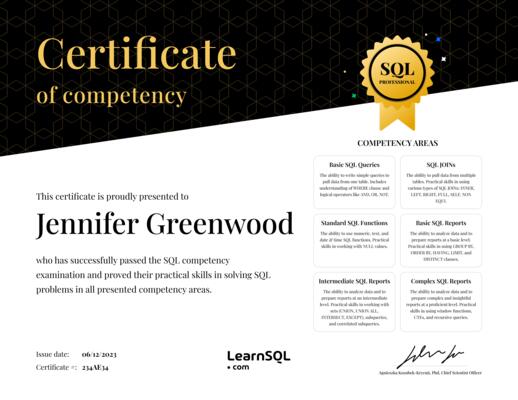Advanced Course
GROUP BY Extensions in PostgreSQL
Would you like to work smoothly and efficiently in PostgreSQL? Do you want to be able to create more complex queries? You need ROLLUP, CUBE and GROUPING SETS for this! Learn all about GROUP BY extension clauses in PostgreSQL.
4.56
1,853 learners enrolled
Free trial Yes
Certificate of completion Yes
Time to complete 7 h
Coding challenges 63
Skills you will gain
- Use ROLLUP with GROUP BY
- Display the order of columns with CUBE, and use CUBE with GROUPING() and COALESCE()
- Use new functions and multiple groupings with UNION ALL
- Use multiple groupings with GROUPING SETS
Last reviews
Description
Do you already know the basics of SQL, but want to develop further? You've come to the right place. This online course is intended for intermediate users. It will be beneficial for beginner data analysts, students, and programmers working with PostgreSQL databases on a daily basis. To make the most of this course, it would be helpful for you to know the topics from our SQL Basics in PostgreSQL course in advance.
Ready to take your PostgreSQL skills to the next level? Discover some of the more advanced SQL features! In this interactive course, you'll learn how to use ROLLUP, CUBE, and GROUPING SETS operations in PostgreSQL.
ROLLUP is an extension of the GROUP BY clause that allows you to attach additional lines which represent subtotals. They are often called super-aggregated rows. They can be presented together with the total sum line. Thanks to the useful ROLLUP extension, you can generate multiple grouping sets using just one SQL query. Pretty convenient, don't you think?
Perhaps you need to generate subtotals? This is where the CUBE extension comes in handy. Use it in your query to get the subtotals for all combinations of grouping columns specified in the GROUP BY clause.
GROUPING SETS is another step further because it allows for computing multiple GROUP BY clauses in a single SQL statement. GROUP BY GROUPING SETS is equivalent to the UNION of two or more GROUP BY operations in the same result set.
No knowledge will be of any use if you cannot put it into practice. Therefore, this course consists of great interactive exercises on GROUP BY extensions. This will give you the necessary practical experience to help you work with PostgreSQL in your projects. It's full of hands-on experience! Learn at your own pace. All you need is a computer, internet connection and motivation to achieve your goals and success!
What's in It for Me?
- 63 interactive exercises. Interact with hands-on exercises for improved retention. Learn at your own pace, from anywhere and at any time.
- Lifetime access to the course. When you purchase the course, you'll get instant personal access to all of its content.
- Online certification. Complete all of the exercises successfully and you'll get a certificate. You can publish the certificate on your LinkedIn profile (here's how).
- 30-day money-back guarantee. If you're not satisfied with the quality of the course, you can get a refund within 30 days of your purchase.
- Hints for the exercises. You can make use of ready-made hints for the exercises or ask questions and share insights with other members of our community through the Discuss tab. You can also drop us a line at contact@learnsql.com, and we'll be more than happy to answer!
Learn How To:
- Use ROLLUP with GROUP BY
- Display the order of columns with CUBE, and use CUBE with GROUPING() and COALESCE()
- Use new functions and multiple groupings with UNION ALL
- Use multiple groupings with GROUPING SETS
What Do You Need to Take This Course?
- A web browser
- An internet connection
- Basic knowledge of SQL, followed by some practice
Who Should Take This Course?
- Analysts who use PostgreSQL to create reports
- PostgreSQL Database Administrators
- Students taking SQL courses in PostgreSQL
- Programmers working with PostgreSQL looking to improve their SQL skills
- Anyone who knows basic SQL but wants to go a step further

Table of contents
Course progress 0%
Exercises completed 0/63
-
ROLLUP
0/21Learn how to use ROLLUP with GROUP BY.
-
CUBE
0/17Discover CUBE, another GROUP BY extension.
-
GROUPING SETS
0/17Let's take a close look at GROUPING SETS, the last GROUP BY extension in our course.
-
Final Quiz
0/8Verify how much you've learned with us in this course.

Get the Certificate of Competency in SQL
This certificate will confirm your practical SQL problem-solving skills
